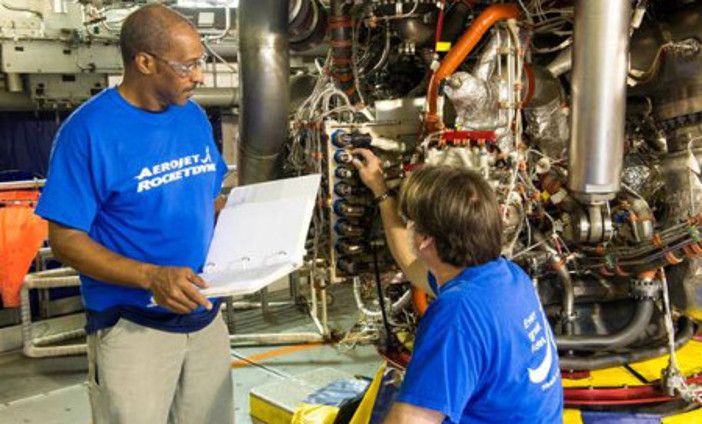Aerojet Rocketdyne and NASA have completed hot-fire testing of an RS-25 rocket engine containing its largest additively manufactured component to date.
It is hoped that the use of additive manufacturing will help lower the cost of future missions of NASA’s powerful Space Launch System (SLS) heavy-lift rocket.
Eileen Drake, CEO and president of Aerojet Rocketdyne, said, “This test demonstrates the viability of using additive manufacturing to produce even the most complex components in one of the world’s most reliable rocket engines. We expect this technology to dramatically lower the cost of access to space.”
During the 400-second test at NASA’s Stennis Space Center in Mississippi, Aerojet Rocketdyne engineers were able to evaluate the performance of a 3D printed vibration dampening device, known as a pogo accumulator assembly, which was manufactured at Aerojet Rocketdyne’s facility in Los Angeles, California.
The pogo accumulator assembly is a complex piece of hardware that acts as a shock absorber to dampen oscillations caused by propellants as they flow between the vehicle and the engine. The pogo accumulator assembly is important to ensuring a safe flight by stabilizing these potential oscillations.
The pogo accumulator assembly consists of two components: the pogo accumulator and pogo-z baffle. Both were made using a 3-D printing technique called selective laser melting, which uses lasers to fuse metal powder into a pattern by adding layer upon layer of material to produce the part. On the pogo accumulator alone, the new manufacturing technique reduced the number of welds by 78%.
The SLS is designed to send astronauts and cargo to explore the moon and other deep space destinations. It uses four Aerojet Rocketdyne-built RS-25 engines.
Additive manufacturing (3-D printing) could potentially simplify the production of many of the RS-25’s thousands of parts and components, reducing costs and increasing reliability by cutting back on the number of pieces that must be welded together. Its use also offers opportunities to shorten development timelines for components and enables enhanced flexibility in the designs.
The new 3D-printed components were installed and tested on a development engine which earlier this year was also used to test new flight controllers for the Exploration Mission-1 flight engines.
Dan Adamski, RS-25 program director at Aerojet Rocketdyne, said, “As Aerojet Rocketdyne begins to build new RS-25 engines beyond its current inventory of 16 heritage shuttle engines, future RS-25 engines will feature dozens of additively-manufactured components.
“One of the primary goals of the RS-25 program is to lower the overall cost of the engine while maintaining its reliability and safety margins. Additive manufacturing is essential to achieving that goal.”
December 20, 2017





